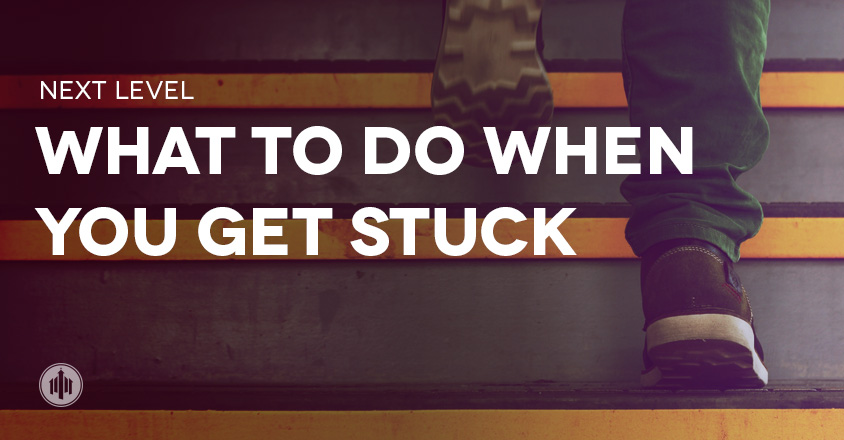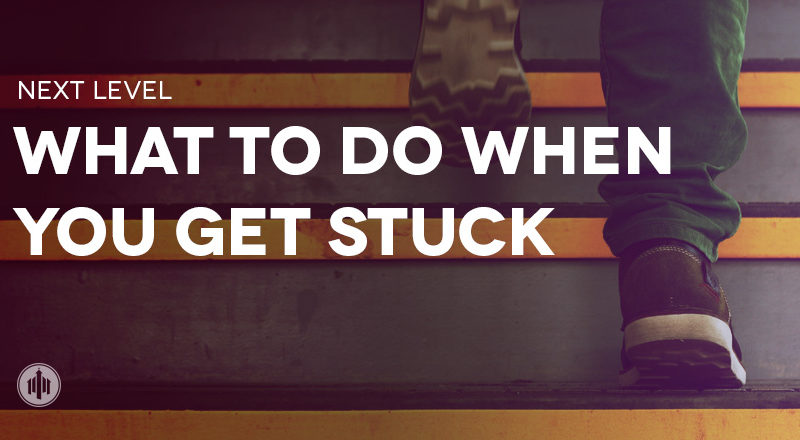
Once when I was eighteen, I was visiting a friend’s house that had a narrow driveway on a steep hill. When it was time to leave, I backed down the driveway a little too quickly, and ran my van off the side of the driveway and into the woods at about a forty-five degree incline. As the van slid down the hill deeper into the woods, I had a sinking feeling that the van’s four-wheel-drive might not save me from this one.
I was stuck. I tried every trick I knew to get my van out of the wooded hillside, but nothing worked. Totally and completely stuck.
The feeling is all too common as a songwriter. Maybe you started off on the right track, sailing along with words and melodies. But all of the sudden, the creative juices dried up and you can’t figure out how to finish the song. Each time you try to work on the song it feels wrong, and eventually you’ll have no passion left to finish the tune. Don’t freak out – this happens to everyone. But you still need a process for finishing those songs, right?
Legendary songwriter Leonard Bernstein once said, “Inspiration is wonderful when it happens, but the writer must develop an approach for the rest of the time…The wait is simply too long.” Just like an electrician or computer developer must have processes for troubleshooting technical problems, songwriters need a means of troubleshooting their creative problems. Here are a few tricks I’ve found to be helpful in the creative process:
Change your environment
Feeling “stuck” is a very cerebral or emotional thing, and changing your environment can significantly alter the way you look at something. Since writers tend to write best when they aren’t afraid of being overheard or judged, I recommend finding a place where you can be relatively secluded. Pick somewhere that might help you reflect and be creative. A lone bench near a river might have a calming effect, for example, whereas a cemetary might help someone process lyrics about death or resurrection.
Switch to a different instrument
Even if you don’t know how to play another instrument, this works surprisingly well. Playing an instrument you’re not as familiar with will lead to strange intervals and sounds that your ears aren’t bored with.
I was feeling bored with my typical writing routine one time, so I grabbed a friend’s banjo that was stashed in our church’s green room. About an hour later I emerged with a full song, verses, chorus, lyrics and all. I translated the song to guitar later on, but I never would have written that kind of song or melody if I hadn’t been playing a banjo to start with.
Re-imagine the song
In a new key, time signature, or groove. It’s possible to get stuck on a song simply because it’s in the wrong key or time signature. For instance, writing a song in the key of “B” is usually toward the top of my vocal range. If I start the verses or chorus too high, there’s nowhere to go on the lift of the bridge because I’ve already reached my highest note in the chorus. But if I drop the key to “G”, it opens up new potentials for a big melodic lift in the bridge.
The same goes for time signatures and grooves. Get creative mixing and matching the melodies you collect on your phone or voice recorder. If you’re willing to sculpt your melodies along the way, you might be surprised how many possibilities you can create.
Listen to new music
There is a simple rule of musical input/output that happens with artists all the time. Sometimes we try and “output” so much that we dry up the well of inspiration. Exploring new music and artists is a great way to refill the well. This is especially helpful if you take an intentional break from writing for a while and listen to as much new music with as much variety as possible. New genres inevitably spark new ideas. For me, listening to new artists and releases on Spotify always stirs up my creativity, even if I don’t particularly like the genre.
Hand the song off to a trusted co-writer
Oftentimes songwriters get stuck on songs when their passion for it as faded. There’s no better time than this to let someone else take a crack at finishing the song. Good co-writers can usually see where the songs strengths are as well as its blind spots. It may be helpful to let your co-writer work on some ideas before coming together to try and finish it out. In the days of smartphone technology, co-writing has never been more easy or accessible.
Take a walk
Seriously. Countless studies have shown that the human brain works on “problems” in the subconscious. At the very least, taking a walk will give you a fresh set of ears and a second wind. But more often than not, taking a break from creativity for a bit will allow our subconscious to keep working even when we’re worn down. I’ve found that taking a break, going for a walk, and asking God for the words and music that will serve His people typically yields the most inspired results.
Next time you find yourself stuck on a song, utilize some of these creative ideas. Just like a car stuck in the mud, the longer you wait, or the more you “spin your wheels,” the more “stuck” you can get. So be bold and creatively courageous, utilize the help of others, and get yourself un-stuck. Getting outside of your writing comfort zone is sure to reignite your creativity in one way or another.



 Leading Kids in Worship
Leading Kids in Worship
Another idea for new music is old music: try listening to classical music, which can be found in the music channels of every cable and satellite provider. It’s amazing how many melodies you’ll recognize in the middle of some symphony or concerto. And while you’re in those music channels, try listening to a genre outside your normal preferences.